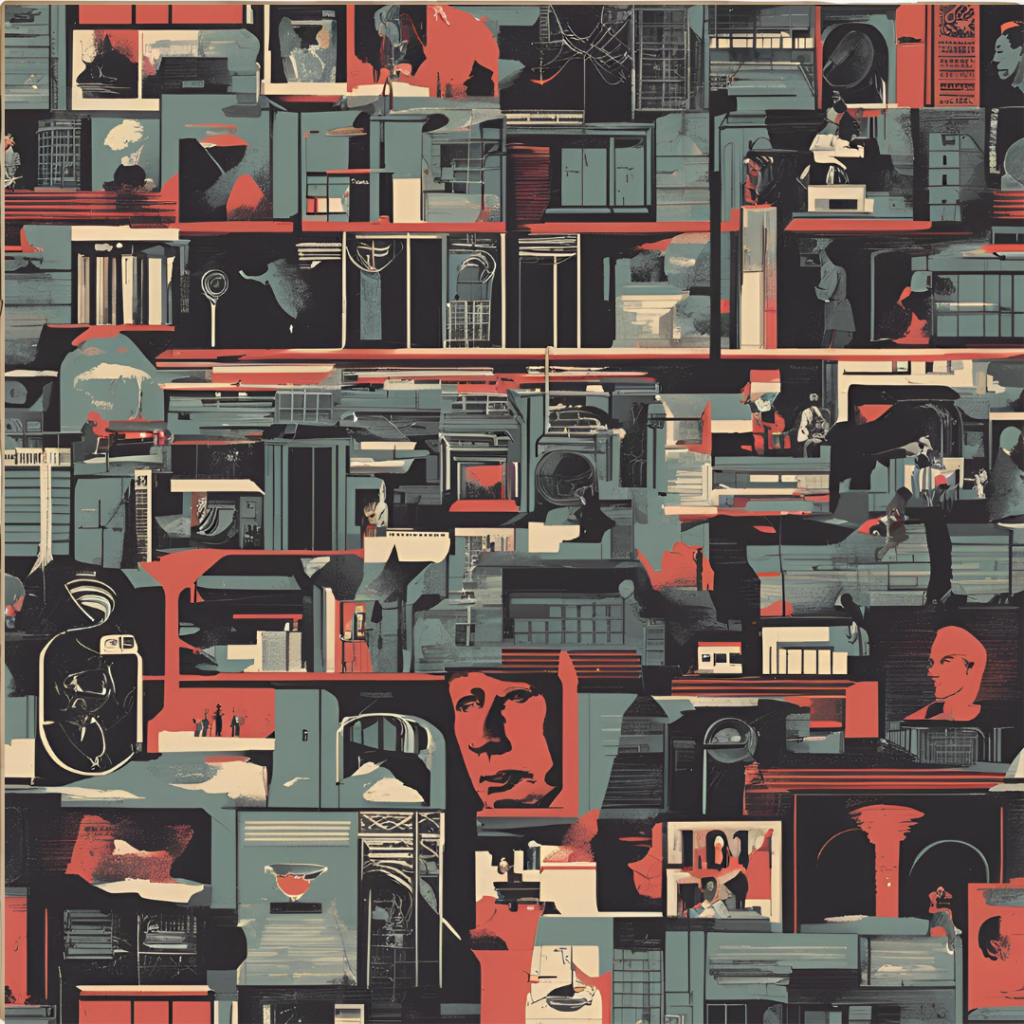Introduction
George Orwell’s “1984” is a masterpiece of modern dystopian fiction. Written in 1948 and published in 1949, this chilling novel presents a vision of a future society controlled by totalitarian forces. Through a combination of compelling characters, chilling political landscapes, and philosophical musings, Orwell explores themes of freedom, truth, and the nature of oppression. Today, more than 70 years after its publication, 1984 continues to resonate with readers as a prescient warning about the perils of government overreach, surveillance, and the manipulation of truth.
This article will examine the key elements of “1984”, exploring the plot, characters, major themes, and Orwell’s vision of a future that may seem eerily close to contemporary times. We will also explore the cultural and political significance of the novel, its impact on literature, and its enduring relevance in the digital age.

1. The Plot of “1984”
The novel is set in Airstrip One (formerly known as Britain) in the superstate of Oceania, one of the three totalitarian regimes that dominate the world, alongside Eurasia and Eastasia. The story takes place in a bleak and oppressive society where the government, represented by the Party, controls every aspect of life, from thought to behavior.
The protagonist, Winston Smith, works at the Ministry of Truth, where his job is to alter historical records in order to align with the Party’s current propaganda. The Party is headed by the figurehead Big Brother, who symbolizes the omnipresent and authoritarian leadership of the regime. Despite the Party’s assertion that “Big Brother is watching you,” Winston harbors deep dissatisfaction with the Party and its control over every aspect of life, including truth, language, and relationships.
Winston begins to rebel against the Party by starting a secret love affair with Julia, a fellow Party member. The two hope to escape the surveillance state and find some form of personal freedom. However, their defiance is short-lived. They are betrayed and arrested by the Thought Police, the organization tasked with maintaining ideological purity. Winston is tortured and ultimately broken by O’Brien, a high-ranking Party member who had earlier pretended to be an ally of Winston’s resistance. O’Brien reveals that the Party’s ultimate goal is not to simply control the people’s actions but to control their thoughts, thereby erasing any possibility of rebellion.
The novel ends with Winston’s complete transformation. He is broken by torture and ultimately comes to love Big Brother, the very figure he once despised. This tragic ending demonstrates the complete power of the Party to not only control the physical lives of its citizens but also their minds, emotions, and beliefs.
2. Key Characters in “1984”
The characters in 1984 are intricately designed to illustrate the oppressive control that the Party exerts over the citizens of Oceania. The following are the major characters in the novel:
Winston Smith
Winston is the protagonist of the novel and serves as a vehicle for Orwell’s exploration of individual freedom and resistance in an authoritarian state. Although he works for the Party and is a member of the Outer Party, Winston secretly despises the Party and wishes for a revolution that would overthrow its control. He represents the struggle of the individual against an overwhelming and oppressive system. However, his hope for rebellion is ultimately crushed, symbolizing the Party’s total control over the human spirit.
Julia
Julia is Winston’s lover and a fellow rebel against the Party. Unlike Winston, Julia’s rebellion is more pragmatic and focused on personal pleasure, rather than ideological resistance. She is skeptical of any grand revolution and instead seeks to live her life in defiance of the Party’s control over intimate relationships and personal freedoms. Despite their different approaches to rebellion, Winston and Julia form an illicit relationship that defies the Party’s regulations and serves as a symbol of their desire for freedom.
O’Brien
O’Brien is a high-ranking member of the Inner Party who initially appears to sympathize with Winston and Julia’s rebellion. He is intelligent, manipulative, and deeply loyal to the Party’s mission. His role as a double agent is one of the most tragic elements of the novel, as he betrays Winston’s trust and subjects him to brutal psychological and physical torture. O’Brien embodies the terrifying power of the Party, which not only controls the physical lives of its citizens but seeks to control their very thoughts and beliefs.
Big Brother
Big Brother is the omnipresent, omnipotent figurehead of the Party, although it’s unclear whether he is a real person or just a symbol created to represent the Party’s authority. His image is everywhere, and the phrase “Big Brother is watching you” serves as a constant reminder of the Party’s surveillance and control. Although he is never directly involved in the plot, Big Brother represents the Party’s power and the totalitarian state that Orwell is warning against.
The Party and the Thought Police
The Party represents the dystopian government that controls every aspect of life in Oceania. It is an entity that thrives on surveillance, repression, and manipulation. The Thought Police are the arm of the Party responsible for monitoring citizens’ thoughts, behaviors, and loyalties. They are the enforcers of ideological purity, ensuring that no one dares to think outside the Party’s official doctrine. The constant threat of surveillance by the Thought Police is one of the novel’s central sources of tension and fear.

3. Major Themes in “1984”
Orwell’s novel is a profound exploration of several key themes that relate not only to the fictional world of Oceania but also to the political and social issues of Orwell’s own time—and perhaps even to contemporary society.
Totalitarianism and Government Control
At its core, 1984 is a critique of totalitarianism. Orwell paints a terrifying portrait of a society in which the government controls every aspect of life, from language to thought. The Party’s control over the truth, as demonstrated by the Ministry of Truth’s manipulation of historical records, illustrates the dangers of absolute power and the ways in which a totalitarian regime can distort reality to suit its own agenda. Orwell’s portrayal of Big Brother and the Thought Police exemplifies the terrifying consequences of unchecked governmental authority.
Surveillance and Privacy
One of the most chilling aspects of 1984 is its depiction of a society under constant surveillance. The Party’s use of telescreens—devices that monitor citizens’ every move and even their facial expressions—illustrates the extreme level of control that is possible in a world where privacy no longer exists. The famous slogan “Big Brother is watching you” reflects the omnipresent surveillance that pervades every aspect of life. The invasion of privacy becomes not only a physical reality but a psychological one, as citizens are led to believe that they are constantly being observed, which ultimately forces them to conform.
Language and Thought Control
The novel introduces the concept of Newspeak, a language designed by the Party to limit freedom of thought. Newspeak’s vocabulary is deliberately restricted to prevent people from articulating rebellious or subversive ideas. This theme of linguistic control is a powerful commentary on how language shapes thought and how governments can manipulate language to control the minds of their citizens. By eliminating words that could be used to express dissent, the Party aims to eliminate the very possibility of rebellion.
Reality and Truth
In 1984, Orwell presents the idea that the truth is not an objective reality but a construct that can be manipulated by those in power. The Ministry of Truth’s constant rewriting of history serves as a metaphor for how those who control information can control people’s perceptions of reality. This theme resonates strongly in today’s world, where misinformation and propaganda are used to manipulate public opinion and obscure the truth.
4. The Relevance of “1984” Today
Despite being written over 70 years ago, 1984 remains alarmingly relevant in the modern world. The rise of mass surveillance, the spread of fake news, and the increasing control of information by governments and corporations all echo Orwell’s warnings about the dangers of unchecked power.
In the age of social media, government surveillance, and the erosion of privacy, 1984 serves as a cautionary tale about the potential consequences of living in a world where truth is malleable and freedom is restricted. The novel challenges readers to consider how far we are willing to go to protect individual freedoms and the integrity of truth in our society.
Conclusion
“1984” is not just a dystopian novel; it is a powerful critique of political systems that seek to control not only the actions but the thoughts of individuals. Orwell’s vision of a world dominated by totalitarian forces is a sobering reminder of the dangers of absolute power and the fragility of personal freedom. Through the lens of Winston Smith’s tragic story, 1984 forces readers to confront the terrifying possibility of living in a world where truth is controlled, privacy is nonexistent, and rebellion is unthinkable.
As we continue to navigate an increasingly complex world, Orwell’s masterpiece remains a vital work that challenges us to reflect on the value of freedom, the importance of truth, and the dangers of governmental overreach. Its themes are more relevant than ever, making “1984” a must-read for those who seek to understand the dark potential of modern societies and the ongoing struggle for personal liberty and truth.










